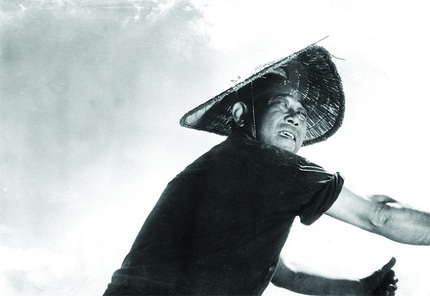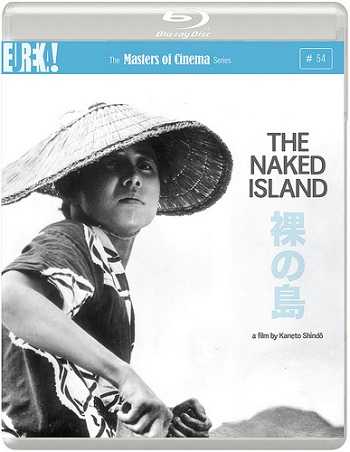Learning From The Masters Of Cinema: Shindo Kaneto's THE NAKED ISLAND

In a career that spanned more than 60 years, Japanese auteur Shindo Kaneto directed more than 40 feature films and is credited with writing over 100 more. While he is probably best remembered for his visually arresting horror films Onibaba and Kuroneko, he was already an acknowledged cinematic voice on the world stage. After cutting his teeth as an apprentice to master filmmaker Mizoguchi Kenji, most notably on The 47 Ronin, Shindo directed his first film, the autobiographical Story of a Beloved Wife in 1951. It was here that he met and fell in love with actress Otowa Nobuko, whom Shindo proclaimed his muse. They would go on to work together many times, and Otowa played the lead in both Onibaba and Kuroneko. Before both of those films, however, she took on the incredibly challenging and physically demanding lead role in Shindo's The Naked Island in 1960.
At the time, Shindo's production company Kindai Eiga Kyokai was on the verge of bankruptcy, and they were all set to shut up shop after a final, low budget swan song. Desperate to produce a film that would make a bold, lasting statement about the desperate struggles of human life, Shindo drew up a simple outline, and together with a skeleton crew and two professional performers, headed to the remote island of Sukune in the Inland Sea, Hiroshima prefecture. Described by the director as "a visual poem", The Naked Island has virtually no discernible dialogue, yet depicts the daily struggles of a single family, the sole inhabitants of this remote island.
With no fresh water supply, the couple, played by Otowa and Tonoyama Taiji, row to a neighbouring island each day to fetch water, carrying it up a winding mountain pass to where they have a small field of vegetables, battling to grow in the sandy soil. Shindo documents their back-breaking efforts in excruciating detail, drawing the audience into the monotonous, thankless, yet occasionally perilous work, and somehow making it utterly riveting. There is a captivating rhythmic quality to the repetitious nature of their work, a sublime synchronicity to how father, mother and two young sons work around each other to set the dinner table, or work the school run into this endless quest for water.

What may sound like tedious viewing is in fact a sublime exercise in minimal filmmaking, lathered with style and formal flourish by Kuroda Kiyomi's gorgeous black and white photography, and Hayashi Hikaru's deliriously melodic score. The daily hardships of this family, heart achingly re-enacted by two incredible lead performances, are so absorbing that I found myself some way into the film before I realised not a word of dialogue had been spoken and that nothing - in a conventional narrative sense at least - had really happened yet.
In the film's second half, events force the family to break routine and venture into the bizarre otherworldliness of a fast-developing post-war Japan. At one point the family encounters a television set, and in stark contrast to the enthralled boys of Ozu's Good Morning (released one year earlier), Shindo's children can only stare at the flickering screen, not so much unable to comprehend it, as ultimately indifferent to what it can offer them.
The Naked Island proved a huge success overseas, played at numerous festivals including the Moscow International Film Festival, where it won the Grand Prix. Shindo was able to sell the film in more than 60 different territories and kept Kindai Eiga Kyokai afloat. However, not all of Shindo's peers were supportive of the film. In particular, Oshima Nagisa lambasted Shindo for continuing to promote an outdated image of Japan to audiences overseas, at a time when many Japanese people were looking to shake off the embarrassment of their occupation following World War II and depict the country as a fast-developing nation that was embracing technology.
Regardless, The Naked Island remains to this day a heartbreaking portrayal of the futility of human endeavour in the face of nature, fate and each other. I had not seen the film before this assignment, but I can now claim with some confidence that it certainly deserves the same recognition as Onibaba and Kuroneko in the director's oeuvre, and should also be considered one of the very best Japanese films of the 1960s, if not of all time.
Previously released on DVD by Masters of Cinema, today sees a brand new 1080p high definition restoration of the film hit shelves, both on DVD and, for the very first time in the UK, on Blu-ray. The disc boasts an audio commentary with director Shindo Kaneto and composer Hayashi Hikaru, recorded in 2000, which goes into great detail about their intentions for the film, as well as the arduous shoot itself, which forced the 13-strong crew to decamp to the remote island for the duration, adopting a lifestyle not too dissimilar to the family onscreen. The disc also includes an excellent introduction from the always-fascinating Alex Cox, as well as a 32-page booklet that includes an essay by Acquarello, and a reprint of Joan Mellen's interview with Shindo from Voices from the Japanese Cinema.
The Naked Island is released on Blu-ray and DVD in the UK today.
Coming Soon...
F.W. Murnau's Tabu: A Story of the South Seas







 (1)-thumb-80x80-93563.jpg)
